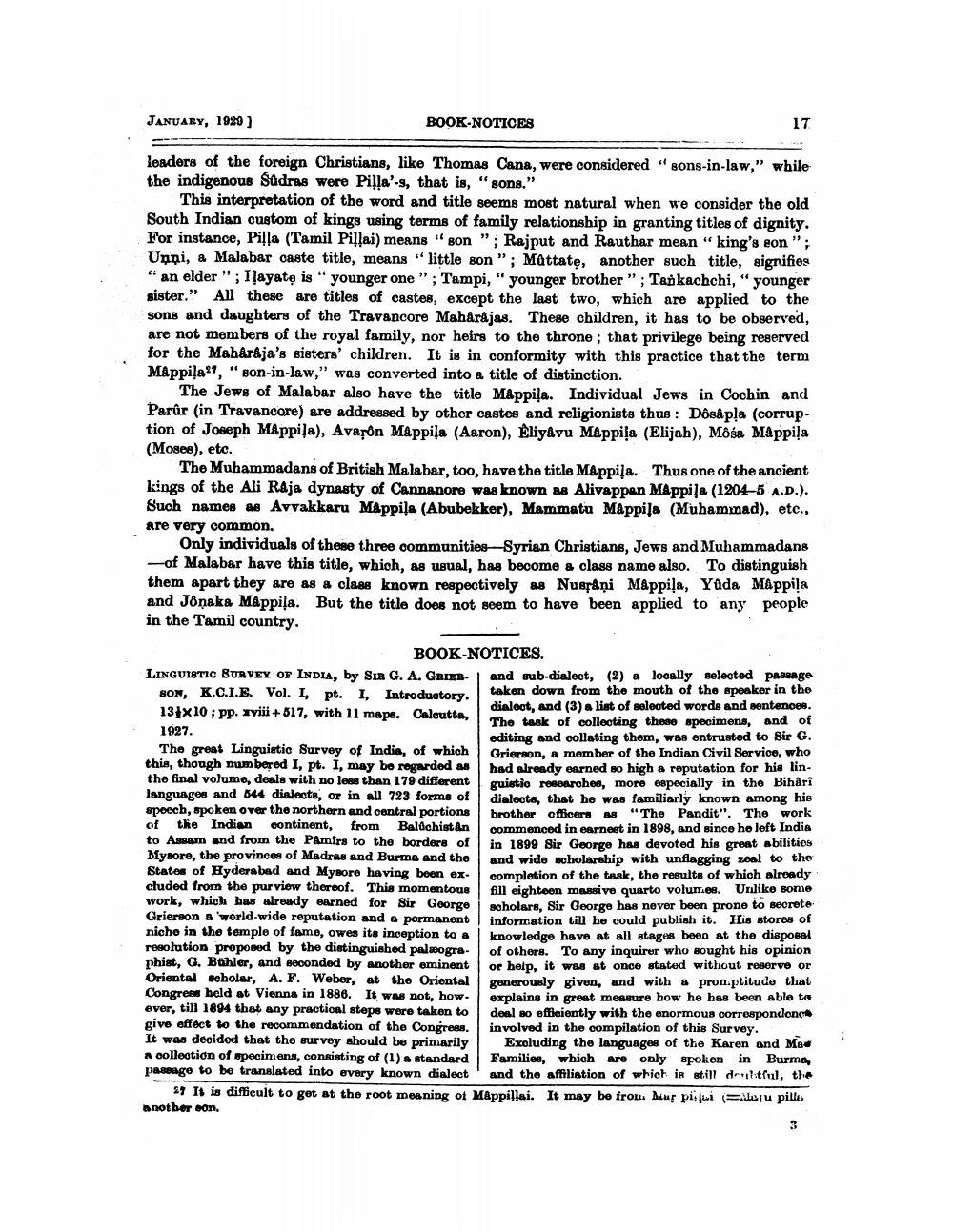________________
JANUARY, 1920)
BOOK-NOTICES
17
leaders of the foreign Christians, like Thomas Cana, were considered "sons-in-law," while the indigenous Sadras were Pilla'-s, that is, “sons."
This interpretation of the word and title seems most natural when we consider the old South Indian custom of kings using terms of family relationship in granting titles of dignity. For instance, Pilļa (Tamil Pillai) means "son" ; Rajput and Rauthar mean "king's eon"; Unni, a Malabar caste title, means "little son"; Mattate, another such title, signifies * an elder"; Ilayate is younger one"; Tampi," younger brother"; Tankachchi," younger sister." All these are titles of castes, except the last two, which are applied to the sons and daughters of the Travancore Mahårå jas. These children, it has to be observed, are not members of the royal family, nor heirs to the throne ; that privilege being reserved for the Maharaja's sisters' children. It is in conformity with this practice that the term Mappila 1, "son-in-law," was converted into a title of distinction.
The Jews of Malabar also have the title Mappiļa. Individual Jews in Cochin and Parûr (in Travancore) are addressed by other castes and religionists thus: Dôsâpla (corruption of Joseph Mappila), Avarón Mappila (Aaron), Eliyavu Mappila (Elijah), Môśa Mappila (Moses), etc.
The Muhammadans of British Malabar, too, have the title Mâppiļa. Thus one of the ancient kings of the Ali Raja dynasty of Cannanore was known as Alivappan Mappila (1204-5 A.D.). Such names as Avvakkaru Mappila (Abubekker), Mammatu Mappila (Muhammad), etc., are very common.
Only individuals of these three communities Syrian Christians, Jews and Muhammadans -of Malabar have this title, which, as usual, has become a class name also. To distinguish them apart they are as a class known respectively 88 Nuspåņi Mappiļa, Yuda Mappila and Jonaka Mappila. But the title does not seem to have been applied to any people in the Tamil country,
BOOK-NOTICES. LINGUISTIC BURVEY OF INDIA, by Sir G. A. GRIEB and sub-dialect, (2) a locally selected passage SON, K.C.I.E. Vol. I, pt. I, Introductory.
taken down from the mouth of the speaker in the
dialoot, and (3) a list of selected words and sentences. 131x10 ; pp. Iviii + 517, with 11 mape. Caloutta,
The task of collecting these specimens, and of 1927.
editing and collating them, was entrusted to Sir G. The great Linguistic Survey of India, of which Grierson, a member of the Indian Civil Service, who this, though numbered I, pt. I, may be regarded as had already earned so high a reputation for his linthe final volume, deals with no less than 179 different guistio researches, more especially in the Bihari languages and 544 dialects, or in all 723 forms of dialecta, that he was familiarly known among his spoocb, spoken over the northern and central portions brother officers as "The Pandit". The work of the Indian continent, from Balochist in commenced in earnest in 1898, and since ho left India to Assam and from the Pamirs to the borders of in 1899 Sir George has devoted his great abilities Mysore, the provinces of Madras and Burma and the and wide scholarship with unflagging zoal to the States of Hyderabad and Mysore having been ex. completion of the task, the results of which already cluded from the purview thereof. This momentous fin eighteen massive quarto volum.ee. Unlike some work, which has already earned for Sir George scholars. Sir George has never been prone to secrete Grierson a world-wide reputation and a permanent information till he could publish it. His stores of nicho in the temple of fame, owes its inception to al knowledge have at all stages boon at the disp resolution proposed by the distinguished palmogra- of others. To any inquirur who sought his opinion phist, G. Bohler, and seconded by another eminent or help, it was at once stated without reserve or Oriental scholar, A. F. Weber, at the Oriental generously given, and with a pron.ptitudo that Congre held at Vienna in 1886. It was not, how- explains in great mensure how he has been able to ever, till 1894 that any practical steps were taken to deal so efficiently with the enormous correspondono give effect to the recommendation of the Congress involved in the compilation of this Survey. It was decided that the survey should be primarily Exoluding the languages of the Karen and Mac a collection of specimens, consisting of (1) a standard Families, which are only spoken in Burma pasonge to be translated into every known dialect and the affiliation of which is still drustful, the
47 It is difficult to got at the root meaning of Mappillai. It may be frou. Mur pidu (=alsu pillen another bon,




